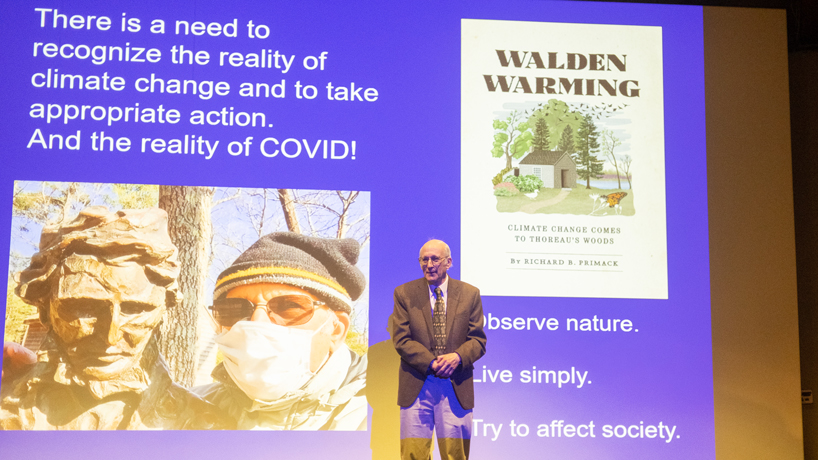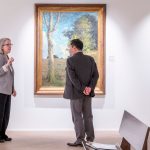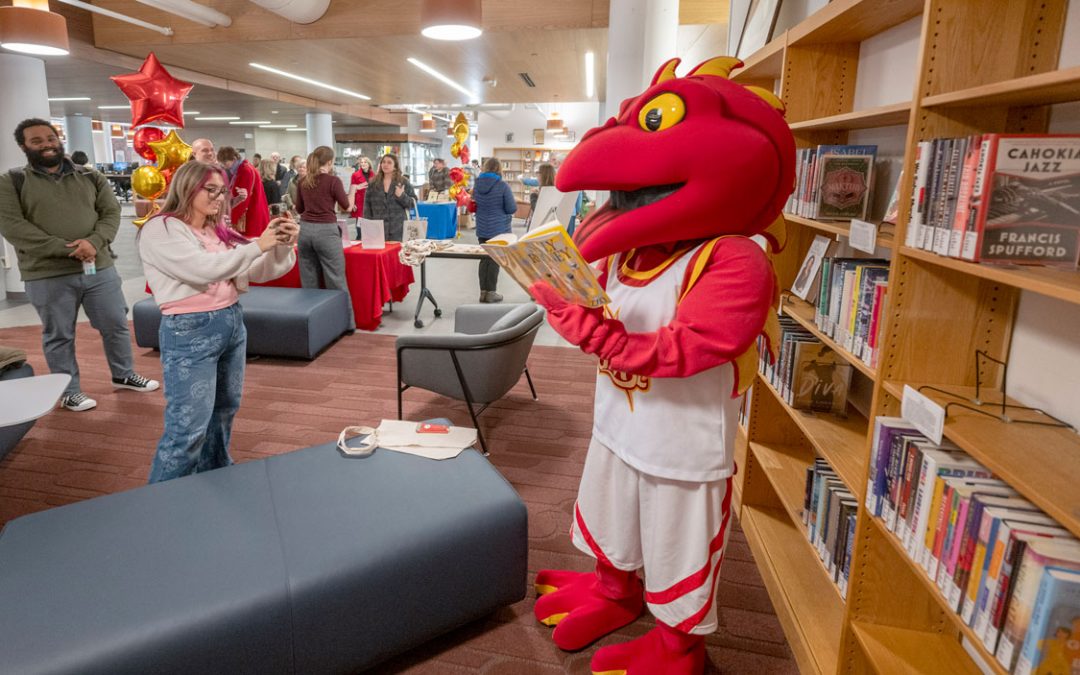
Boston University Professor Richard Primack listens to a question from the audience while delivering the Jane and Whitney Harris Lecture last Thursday at the Saint Louis Zoo. The lecture on “Walden Warming: Climate Change Comes to Thoreau’s Woods” was hosted by UMSL’s Whitney R. Harris World Ecology Center. (Photo by Steve Walentik)
The writings of famed American naturalist, essayist, poet and philosopher Henry David Thoreau have served as inspiration for legions of preservationists and conservationists for more than 170 years.
Richard B. Primack, a professor of biology at Boston University noted for his continuing research on climate change and its impact, proudly counts himself among that group.
“Thoreau is my hero,” Primack told an audience of nearly 100 people last Thursday evening in the Anheuser-Busch Theater in the Saint Louis Zoo’s Living World building while delivering the Jane and Whitney Harris Lecture, sponsored by the Whitney R. Harris World Ecology Center at the University of Missouri–St. Louis.
Primack maintains a close connection to Thoreau’s book “Walden,” and not just because of the wisdom he found in the author’s reflections on simple living in the natural surroundings around Walden Pond, near Concord, Massachusetts.
In fact, Primack has relied on Thoreau’s detailed observations – including dates, locations and descriptions – from around Walden Pond, as well as observations by Alfred Hosmer a few decades later, to provide a baseline to measure the effects climate change is having on the environment there.
Thoreau made note of when the last ice melted from the pond, when flowers bloomed and the trees started showing leaves, and birds returned to the area. He also observed the abundance of different plant species found in the woods.
When Primack and his students returned to Walden more than 150 years later, they observed patterns much different than in Thoreau’s time. The thaw came sooner, the flowers bloomed earlier, and the trees began showing their leaves weeks ahead of time. But the observed changes didn’t always line up with each other or the behavior of birds and other wildlife – including fish, salamanders and butterflies that live in the nearby woodlands and river meadows, as well as the pond itself – creating real stress on the ecosystem.
He also noted that many wildflower species that Thoreau observed have declined in abundance or disappeared from the area.
Primack, whose research has led to numerous journal articles, also gathered his findings in his 2015 book “Walden Warming: Climate Change Comes to Thoreau’s Woods,” which was also the title of last week’s lecture.
Based on his research, Primack told the audience that the climate in Concord today more closely resembles what the climate would have been like in New Jersey in the 1960s, and if current trends continue, it will more closely align with the climate of the Carolinas by the end of this century. That has real consequences for rare plants and animals, such as the Venus flytrap, native to the subtropical wetlands of North and South Carolina, which are also changing and warming. As climate change continues, he discussed the need to take action to preserve these species, including the possibility of relocating the Venus flytrap further north.
Primack’s appearance marked the return of the Jane and Whitney Harris Lecture, which was first held in 1991 but had been dormant since 2017.
Nathan Mucchala, an associate professor of biology at UMSL and the interim co-director of the Harris Center, was excited to bring Primack in to speak at a free event held in partnership with the Saint Louis Zoo, the Missouri Botanical Garden and the St. Louis Academy of Science.
“Richard is a world-renowned conservation biologist, and he’s done lots of great science,” Muchhala said. “He’s also known for public outreach and is regarded as a really good speaker.”
The Jane and Whitney Harris Lecture was created to bring in experts from across the nation to share their knowledge and experiences with students and the wider community. It fits with the Whitney R. Harris World Ecology Center’s long-term vision to reverse the trend of biodiversity loss through community education, research and the training of students who then take on decision-making positions in regions and countries where biodiversity is threatened.
Primack believes Thoreau has much to teach people today about how to fend off the effects of climate change, which are threatening so much of our natural world.
“Thoreau has very simple messages about how we should live individually and how we should live as a society, and these are really the key themes of how we should deal with climate change,” Primack said.
He noted Thoreau’s calls to observe nature, which will lead to greater awareness of climate change and its impact, and to live simply, which will lead people to use fewer resources and energy while also making them live healthier lives.
“Then the third thing is, if you read his book, he’s constantly urging us to stand up against injustice and to take strong stances against things which are wrong,” Primack said. “That is really, again, the message of how we deal with climate change. Unless we pressure the federal government to take a strong stance against climate change and to reduce the emissions of carbon dioxide by American society – and to get the United States government to take the leadership in dealing with climate change – it’s not going to happen, and we won’t really be able to stop climate change from happening.”














